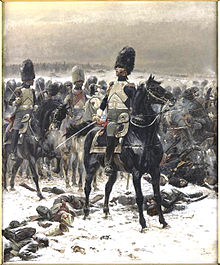- Old Guard
-
"La Vieille Garde" (The Old Guard) 
Private of the Grenadiers of the Old GuardActive 1804 - 1815 Country France Branch French Army Type Veterans Role Élite troops Engagements Ligny, Wagram, Waterloo, Lodi, Dresden, Austerlitz Commanders Notable
commandersDorsenne ; Bessières ; Davout ; Soult ; Cambronne The Old Guard (French Vieille Garde) were the elite veteran elements of the Emperor Napoleon's Imperial Guard. As such it was the most prestigious formation in Napoleon's Grande Armée.
The Old Guard was formed of veteran soldiers who had served Napoleon since his earliest campaigns.
It is believed that Napoleon hand-selected members of his Old Guard based on physical traits, most notably above-average height. Their imposing stature was likely impressive to foes and allies alike. Serving in the army for several years as well as a citation for bravery were also taken into consideration when selecting troops into the Old Guard.
Contents
Old Guard infantry
 Wearing their distinctive bearskin caps, Napoleon’s Old Guard was the most celebrated and most feared elite military formation of its day.
Wearing their distinctive bearskin caps, Napoleon’s Old Guard was the most celebrated and most feared elite military formation of its day.
There were four regiments of Old Guard infantry: the 1st Grenadiers, 2nd Grenadiers, 1st Chasseurs, and 2nd Chasseurs and belonged the Imperial Guard under Emperor Napoleon. Members of The Guard benefitted from a number of different privileges. The wages of individual soldiers in The Guard was considerably higher than any other military unit in Napoleon's Imperial Guard. Another privilege reserved only for the members of the Old Guard was the freedom to express their discontent freely: the Old Guard Grenadiers were known as les Grognards ("the Grumblers") because they openly complained about the petty troubles of military life. Some of the officers even did so in the presence of the Emperor knowing that the Old Guard's reputation commanded enough respect with Napoleon to allow itself such openess. Such behaviour was unique to the Old Guard and would have been severely punished were it engaged in by a member of any other unit.
Requirements for Old Guard candidates:
- under 35 age- at least 10 years' service
- at least 3 campaigns (some had as many as 12 campaigns) In 1814 the 1st Chasseurs still had many old-timers: for example sapper Rothier - 21 years' service, 2 wounds, Private Stoll - 22 years' service and 20 campaigns. Those who were too old, or crippled were sent to Company of Veterans in Paris. This small unit was full of soldiers, some lacking an arm, others striped like zebras with saber cuts.
Members of The Guard could however, allow themselves such freedom for each and every man was a highly trained soldier and mustered into regiments; a formidable sight on any battlefield. Almost always above average height (1,85m) and being imposingly well-built a Guard was taught to fight unlike any other soldier in the French Army. Any cowardly tendencies or otherwise cautious habits would be thoroughly purged through the help of a longer and more intense training (often including advanced bayonet and hand-to-hand combat techniques). Yet The Old Guard earned their fearsome reputation through the many military engagements of the Napoleonic Wars. From the Battle of Ligny, to the battle of Dresden, to the famous and final battle at Waterloo (June, 1815).
Old Guard cavalry
There were four regiments of Old Guard cavalry: the Grenadiers à Cheval (mounted grenadiers), Chasseurs à Cheval (mounted chasseurs), Dragons de l'Impératrice (the Empress's Dragoons), and the 1st Polish Lancers.[citation needed]
The Mamelukes squadron was also considered part of the Old Guard cavalry.
The Legion de Gendarmerie d'Elite (elite Gendarmes) was counted as Old Guard cavalry. It was deployed in detachments as escorts for Napoleon's headquarters and the General Staff of the Guard, and for Imperial Guard field camps.[citation needed]
End of the Old Guard
 Napoleon saying goodbye to the Old Guard in the Palace of Fontainebleau, after his first abdication (1814).
Napoleon saying goodbye to the Old Guard in the Palace of Fontainebleau, after his first abdication (1814).
The Old Guard was disbanded by the victorious Sixth Coalition in 1814, along with the rest of the Imperial Guard. During Napoleon's 1815 return from exile, the Old Guard was reformed, and fought at the Battle of Waterloo. It was during this battle that units of the Middle Guard were routed from the battlefield for the first and only time.
The 2e Regiment de Grenadiers-à-Pied were pivotal in the defense of the town of Plancenoit against the Prussians.[1] The 1er Regiment, charged with protecting the field position around Napoleon himself, served as a rear guard after the failure of the attack of the Middle Guard on the British center.[2] The Old Guard cavalry was involved in the unsuccessful midday charges against the British infantry, and was unavailable at the battle's decisive moments. Napoleon had used every reserve except the Old Guard. Faced with overwhelming firepower and numbers, the Old Guard infantry, for the first and only time in their history, withdrew from the battlefield.
In August 1815, Louis XVIII ordered the Imperial Guard abolished. By December all the Old Guard regiments were disbanded. Ex-guardsmen ended up in a variety of places after their units disbandment. Some re-enlisted into the king's army. Others traveled to a French colony in Texas. Most lived out their lives watched with suspicion by Bourbon police. When Napoleon's body was returned to France in 1840, many of the surviving Old Guard paraded in threadbare uniforms.
Contemporary use
Nowadays, in France, the expression la vieille garde (without uppercase) is used when talking about longtime close followers of a politician and has a mildly pejorative meaning. This expression is particularly popular among political journalists.[citation needed]
See also
References
- ^ Old Guard Grenadiers in Plancenoit (retrieved 2010-08-10)
- ^ The Last Squares of the Old Guard (retrieved 2010-08-10)
External links
Categories:- French military units and formations of the Napoleonic Wars
Wikimedia Foundation. 2010.

